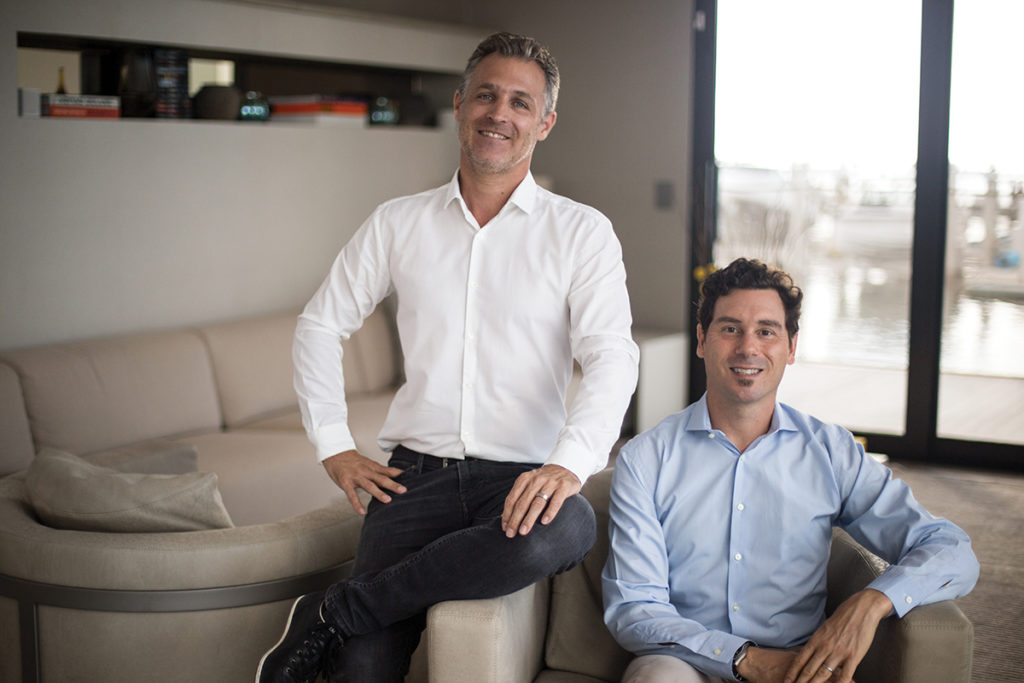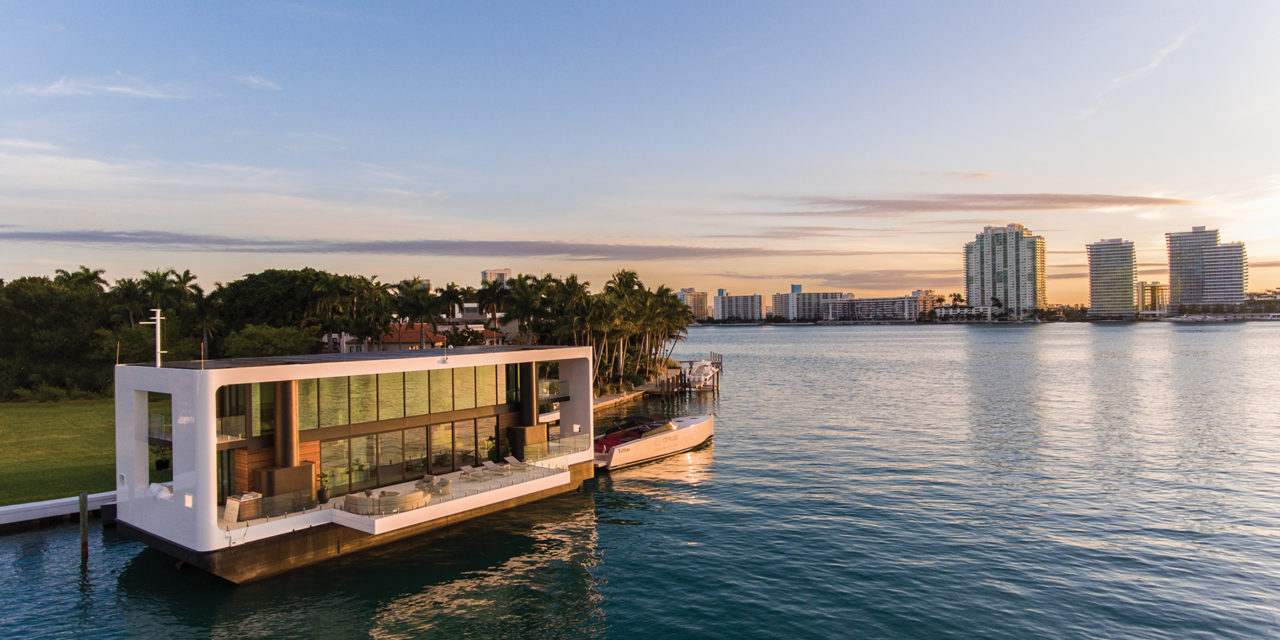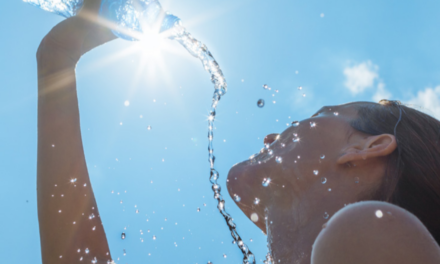Arkup Takes Living on the Water to the Next Level
“Go green, live blue.” It’s the concept behind the Miami-based company, Arkup – manufacturer of luxury, livable yachts.
Who would have thought it possible! A vacation getaway, a downsized home, an entertainment venue, a guesthouse, even a floating restaurant. All unique destinations, literally located on the water. Yet, all are options with the company’s product line, particularly the Arkup 40, currently the most popular and versatile design that will soon be delivered to over a dozen new clients this year.

Arkup co-founders Nicolas Derouin, CEO, and Arnaud Luguet, chief product officer, have been hard at work fine-tuning and expanding their product, yet ultimately have a broader vision in mind. They plan to not only manufacture and build these unique vessels, but to create self-sustaining blue communities. For the two engineers and longtime friends turned business partners, it’s all about finding “green” solutions to the ongoing challenges presented by climate change, rising sea levels and overcrowded cities.
Derouin explained that the impact of rising sea levels on coastal cities, including Miami, and a commitment to sustainable living is at the very core and the driving force behind their unique approach to building these vessels.
Luguet and Derouin launched Arkup in 2016. The company is named for the biblical Noah’s Ark and “up,” which refers to the retractable legs called spuds that reach to the ocean floor and are built into each of the vessels. These legs represent an innovative engineering design – one of the features that sets these vessels apart from a more traditional houseboat. Derouin explained that the yachts are anchored in shallow water and raised above the sea line. Because of the anchoring system, they maintain stability during tropical storms. “The wave action and the surge during a storm goes under the boat without touching the hull,” he said. “It’s the same type of technology used in the oil and gas industry for offshore platforms and oil rigs.”
Another unique aspect of the vessels is that they are solar-powered and eco-friendly. Derouin noted that other types of houseboats typically depend upon water, septic systems and power from a land grid or have generators onboard. But Arkup yachts are completely self-sustaining. The vessels are also motorized, which means an owner can pick up and move their yacht from one destination to another. Clearly, a perk for any potential buyer. Some clients may choose to dock the vessel in a marina near their home to be used as a guesthouse. But then it can easily be transported to another location.
Longtime Friends Turned Business Partners
The co-founders have known each other since they were teenagers in France. The 46-year-old Derouin was born and raised in France. He lived in Paris and in the south of France near Marseilles, along the Mediterranean Sea. His parents sent him to an international school, he explained, which created a global mindset. He obtained his engineering degree at France’s Ecole Centrale De Lille. “I always wanted to have some experience living and working abroad,” reflected Derouin.
In 1999, after graduation, Derouin moved to Mexico where he worked for a French company. He later relocated to Brazil for about 15 years. His engineering concentration, in both countries, was in logistics and transportation services. Along the way, Derouin learned Spanish and Portuguese. He already spoke English, so he is conversational in four languages.
The Evolution of Arkup
Derouin shared how Arkup came about: “In 2015, I decided to take a gap year, to stop working and travel around the world with my girlfriend, Joanna, who is now my wife.” They spent much of their journey in Southeast Asia, Australia and New Zealand. Although they returned to Brazil (where Joanna is from) after their travels, they were seeking new professional challenges. At about the same time, Derouin crossed paths with longtime friend and fellow engineer, Arnaud Luguet. “Arnaud had been living in Miami and was working on wind farms and renewable energy projects,” recalled Derouin. Luguet described to Derouin the venture he had in mind for Miami: to build self-sustaining, solar-powered luxury yachts. He asked if Derouin might be interested in joining him. The engineering and manufacturing of these livable vessels would be based on models that already existed in parts of Europe.
This fresh approach to developing alternative homes really caught Derouin’s attention.
“It’s what motivated me to move to Miami,” he said. The city also seemed like a place where he and Joanna could readily acclimate. “It’s an easy place to move and adapt because of the Latin culture here and the proximity and ease to travel to both France and Brazil,” said Derouin.
Luguet was also born and raised in France, but his mother is from the Netherlands. As a child, Luguet often traveled there to visit family. In the Netherlands, Derouin explained, there’s a culture where living on and with the water is commonplace. “A large part of the country is under sea level, and there are entire districts in Amsterdam that are floating communities,” he said. After Luguet had been living in Miami, he saw firsthand the impact of climate change and rising sea levels, explained Derouin. There was flooding, shore erosion and other issues that needed attention. In fact, he added, that the city of Miami has been addressing many of these concerns. “The city has been investing money in infrastructure to make it more resilient to climate change and natural disasters,” he said. Such measures include raising the streets so when hurricanes and storms occur, they are less subject to flooding. Miami has also changed building codes for new construction and installed pumps in neighborhoods so that rainwater discharges into the bay.
Creating Innovative, Solar-Powered Vessels
Luguet’s idea to create livable, solar-powered vessels and incorporate innovations such as the development of an anchoring system seemed a perfect match and challenge for the engineering skills of both men. Shortly after Derouin and his wife moved to Miami, Arkup took flight.
In 2017, much of the company’s focus was on the design and engineering of the product. “It was about all the research and development for core technologies,” said Derouin.
In 2018, the business channeled its efforts toward manufacturing the first livable yacht. Much of the design and engineering was and still is done in-house at Arkup. Derouin and Luguet also partner with various contractors, such as Waterstudio, an architectural firm based in the Netherlands, which works exclusively with floating communities. In the United States, they work with marine engineers and naval architects to ensure that the design and construction of their products meet the safety standards set by the U.S. Coast Guard and boat builder associations.
In February 2019, the Arkup 75, their flagship product, was introduced at the Miami Yacht Show. The 75 references the length of the vessel. It was sold to a private owner in 2020.
In those early days of the product launch, the company received a lot of media attention. The co-founders also did some rentals through Airbnb. Arkup was the subject of a Discovery channel documentary segment about living off the grid. It was featured in a Netflix series and named one of the world’s most amazing rentals. Local newspapers and magazines also took notice. Clearly, the concept was eye-opening throughout the Miami community.
“The Arkup 75 was for a very niche market,” explained Derouin, adding that the model sells for $3 to 8 million. “The Arkup 40 is a much more affordable product, priced from about $800,000 to $1.3 million.”
The Arkup 40 can be customized depending upon the intended purpose and needs of a buyer. Some are two bedroom, two baths; others are one bedroom, one bath or one large room for perhaps a yoga studio or restaurant. The interior is about 660 square feet, but with the space on the outer decks, there’s a total of about 2000 square feet.
Derouin pointed out that since these vessels are registered as boats, they are not subject to Florida property tax. It’s another positive feature.
The response to Arkup continues to receive rave reviews, yet Derouin and Luguet are looking to the future with a grander vision. “Our long-range master plan is to develop blue communities and resorts,” said Derouin. “With these larger scale projects, our goal is to have an even greater impact.”
Learn more at arkup.com.









